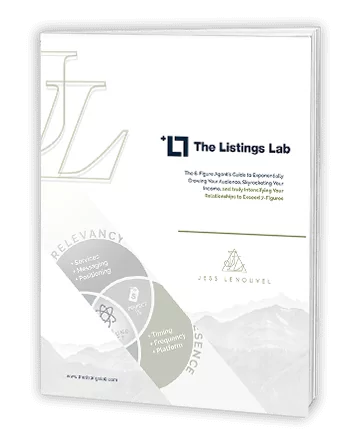Have you ever felt hesitant to set up systems for your real estate business?
You’re constantly busy, so when you think about building a whole system out from scratch, you might think to yourself:
“It’ll be faster to do it manually this one time.”
That might seem like the best and quickest solution at the moment but…
One time turns into twice.
Then, it’s once a month.
Then weekly.
Until suddenly, you’re stuck in a cycle doing the same tasks manually over and over.
All this time, you could have had automated systems to save you countless hours of work.
By working without the proper real estate systems in place, you become the bottleneck of your business.
Systems exist to simplify your processes, save you time, and allow your business to grow with ease.
When you’re stuck spending time and energy on low-value tasks, you can’t focus on scaling your business.
Today, I want to show you how building your systems NOW sets you up for long-term success.
So, let’s get into it, shall we?
8 Basic Systems For Real Estate Agents
A system is made up of the tools and processes that you use for different parts of your business.
Think of them as the bricks your business’s foundation is built on.
As your business grows, it will need to scale its operations to meet increasing demands.
When you have the right systems in place, that growth becomes so much easier.
Here are 8 basic real estate systems for realtors:
- Marketing Systems
Your marketing system encompasses the strategies and processes you use to reach and engage your target audience.This would include your processes for planning and scheduling social media posts, email campaigns, and ads.
- Client Generation Systems
A client generation system helps you expand your audience and increase sales.The best client generation systems use automations and funnels to ensure a steady stream of leads.
- Onboarding Client Systems
What do you do when you take on a client?Your onboarding system will make sure every new client you sign receives the same top-notch experience from the start.
- Offboarding Client Systems
Just as your onboarding systems are for when you take on a client, offboarding systems are for when your contract has ended.This keeps clients happy and encourages repeats and referrals.
- Contract-To-Close
Think of all the tasks you do repeatedly, from signing contracts to closing deals, including transaction management.90% of contract-to-close can be automated.
This saves time and money and lessens the amount of inefficiency in your processes.
- Nurture Systems
Your nurture systems cover your database and referral network.Keep in touch with your past clients and prospects without constant manual effort.
- Team Training Systems
Your team training systems would include your standard operating procedures and FAQs.This way, your team knows where to go to find information without constantly asking you questions.
- Financial Tracking Systems
Insufficient financial tracking is often the primary source of poor business performance and decision-making.You should be able to look at your numbers, know your burn rate, and see your expenses at a glance without pouring over spreadsheets.
Quick access to your finances helps you make fast and informed business decisions.
Signs You Need To Fix Your Real Estate Systems
Agents often come to me telling me they already have a system in place. When I press them further, they tell me they have a checklist for the tasks they need to complete.
Checklists are NOT systems.
And they’re certainly not scaleable! Checklists lack sophistication and automation, requiring you to do a lot of manual labor.
But all of that manual work will eventually lead you to crumble under stress and overwhelm.
Efficient real estate systems and processes are the backbone of running a successful business.
But how do you know when your systems need fixing?
Here are 3 signs to look out for:
1. Things Are Falling Through The Cracks
A huge systems red flag is if you’re noticing frequent and recurring mistakes.
Maybe emails aren’t getting responded to, social content isn’t getting posted, or invoices aren’t being sent on time.
These things start out small, but they add up to become big issues.
Mistakes made because of human error or forgetfulness need to be automated.
It’s time to look into real estate automation tools to seal up the cracks and make sure nothing gets missed.
2. You Are Constantly Jumping In To Fix Things
How many times a day do your team members message you to ask questions?
If your answer is too many times, it’s time to take a closer look at your systems.
Frequent interruptions from team members keep you from focusing on high-level tasks as CEO.
3. You basically become the administrator of your team.
Your productivity drops drastically because every detail of every task comes through you.
Instead, set up systems and processes that allow your team to be resourceful and help your business run more smoothly.
Ready to step away from being an administrator and become a CEO?
Check out this blog: How Real Estate Team Leaders Can Master Delegation And Step Into Their CEO Shoes
4. Your Business Can’t Run Without You.
The real test of a successful business is if it can run without you.
A well-structured business should have the right systems and processes in place to function efficiently without you always being around.
It should be self-sustaining with room to grow and scale.
If you can’t step away without everything falling apart, your systems need some serious work.
What Should You Include In Your Real Estate Systems?
There are four major elements of any real estate system.
Whether your goal is to generate leads or train team members, each of your systems needs to have a clear outcome, standard operating procedures, and a connection to your next system.
1. A Clear Outcome – Each of your systems should have one specific goal you want to achieve.
This clarity helps your processes stay focused and efficient.
2. Standard Operating Procedures (SOPs) – SOPs are the guidelines for any process you must complete in your real estate business.
Their main goal is to get information out of your brain and into the hands of your team.
This creates consistency and quality throughout all of your services and operations.
3. Automations – Automations are key to handling repetitive tasks and decreasing the chance of human error.
Anything from sending follow-up emails to updating client records can be automated.
This allows you and your team to focus on more strategic tasks to grow your business.
4. A Connection to the Next System – Your real estate systems don’t exist in isolation. Everything should be connected.
For example, after your client generation system captures a lead, it should seamlessly transition into your client nurture system.
This continuous flow and connection will make your business scalable and self-sufficient.
By incorporating these four elements, you’ll create robust real estate systems that drive efficiency, maintain quality, and support sustainable business growth.
A 4-Step Process for Creating Systems
If the idea of creating systems for your real estate business seems overwhelming, think of it this way…
Imagine you’re in a helicopter, looking down at a vast river system. From up high, you see countless rivers twisting, merging, and breaking off again, forming an intricate network that appears incredibly complex.
However, if you zoom in and focus on just one small part of the system – imagine yourself sitting on a riverbank – you’ll see that it’s simply one river flowing in front of you. It’s much easier to understand and navigate when you break it down into smaller, manageable pieces.
Creating systems for your business works the same way.
Instead of trying to tackle the entire system at once, focus on building one piece at a time.
Gradually, as you develop and implement each component, they’ll come together to form a complete, interconnected system that helps your business run smoothly.
To get you started, here is our 4-step process for creating real estate systems:
Step 1: Decide What You Need Systems For
Start with a task audit. What things do you need and want systems for?
Think of your lowest-value tasks first.
Are you still manually sending emails to schedule meetings? Or maybe your admin is inputting client information one by one into your CRM?
By auditing your tasks, you’ll be able to see where systems can save you the most time and effort.
Step 2: Go Through the Individual Steps Of The Process
Break down each step of the process you want to systematize.
What are you currently doing and how are you doing it?
This detailed look will help you see what can be improved or automated.
Now is also a good time to start drafting an SOP for this process.
Step 3: Eliminate, Automate, Delegate
After you’ve analyzed your process, ask yourself three questions:
- What can be eliminated?
- What can be automated?
- What can be delegated?
If there’s any part of your process that isn’t necessary or doesn’t bring in any real value, eliminate it.
Then decide what parts need to be automated or delegated.
Always prioritize automation over delegating. If a piece of tech can do it for you, automate it and save the higher-level tasks for your admin.
Thinking of hiring your first admin?
Check out this blog on hiring a real estate administrative assistant: Want To Hire A Real Estate Administrative Assistant? Here’s What You Need To Know
Step 4: Build Your System
Now that you have the final steps of your process, it’s time to build the system itself.
Create your automations and make sure triggers are in place to notify your team whenever they need to step in.
Double-check to make sure each step flows smoothly into the next.
Then, finalize your SOP and make sure your team understands each part of the process.
Remember, it’s easiest to start with only what you need systematized first. Don’t try to build your entire river system in one shot.
Is Your Real Estate System Successful?
Now that you’ve built your real estate systems and processes, are they successful?
The goal of each system is to create efficiency for you and your team and ultimately allow you to scale.
If your systems are successful, they should cover these four factors:
Everything Is Connected
Systems don’t live in a silo.
Each system within your business has a specific outcome, but they should all be working together.
Everything should be connected.
Your marketing system should be connected to your nurture system which is connected to your onboarding, contract-to-close, and offboarding systems.
Everything should flow from beginning to end.
This connection between your systems is how no part of your process is forgotten and allows you to grow.
It’s Scale-able
If your goal is to scale your 6-figure business to 7-figures, you need a system that can handle that workload without breaking.
Ask yourself: If someone dropped a hundred clients on you, what would happen?
Would your systems be able to handle it?
A sign of a good system lies in its scalability.
Even if you receive a hundred new clients tomorrow, your systems should still be able to operate perfectly.
If there’s any part that would break under that pressure, that’s what you need to focus on fixing.
It Leverages Automation
The idea behind creating successful systems is that there should be as little human or manual input as possible.
This is why you should be leveraging automation wherever you can!
Automation is key to reducing human error and increasing efficiency.
As long as you have a team member occasionally checking in to make sure your automations are running properly, they’re very reliable.
I recommend using an automation tool like Zapier. It uses ‘zaps’ to connect your real estate tools and systems to each other, minimizing the need for manual intervention.
With routine tasks handled automatically, you can focus on more strategic activities that need a personal touch.
It Expands Your Capacity & Reduces Overhead Costs
The more you scale, the more moving parts there are to your real estate processes.
Most agents make the mistake of hiring more people to manage this complexity.
But what if you could build better systems and save instead?
With the right systems and automations, you can reduce your overhead costs and prevent over-hiring.
A good real estate administrative assistant costs around $30-40/hour.
It’s more cost-efficient to spend $400/year for Zapier to automate your manual tasks and hire only one admin.
Even if you still hired two admins, they would have significantly more hours to focus on advancing projects instead of getting bogged down by routine tasks.
How much more would be accomplished if you systematized and automated as much as possible in your business?
What kind of projects would you be able to move forward with or complete?
Systems create efficiency and efficiency is key to creating more with less time.
If you take the time to invest in building a system, the capacity for your output goes up drastically.
You and your team would gain more time, and you’ll be able to push forward on your goals.
Pro Tip: When You Build a System, USE IT!
Building a system is just the first step.
Now, you actually have to USE it.
Whether it’s checking tasks in Airtable or managing clients in Follow Up Boss, you really have to live in your systems.
Otherwise, you’ll be back at square one and steps in your processes might be forgotten.
Get in the habit of checking your systems. At the same time, check in with your team to make sure they understand why the system is important.
When a team member goes rogue and stops using your systems, they’re just creating more work for someone else.
It’s up to you to reiterate how following the systems will make their lives easier so you can all maintain efficiency and achieve success.
When you’re doing everything manually, you’re relying on your own motivation to get things done every day.
And no one is motivated every single day.
It’s time to stop relying on discipline and start relying on well-oiled systems.
With well-designed and automated systems, you know you can feel good about what’s getting done – even on the days when you need a break.
When you join our 7-Figure Agent Collective program, we teach you how to leverage a team and proven systems to scale your business to 7-figures.
Are you ready to win back your time by building robust real estate systems and a powerhouse team?
Click HERE to schedule a call with our team to learn more about how we can help you get there.








